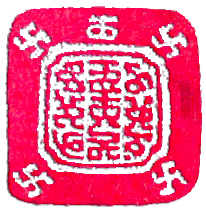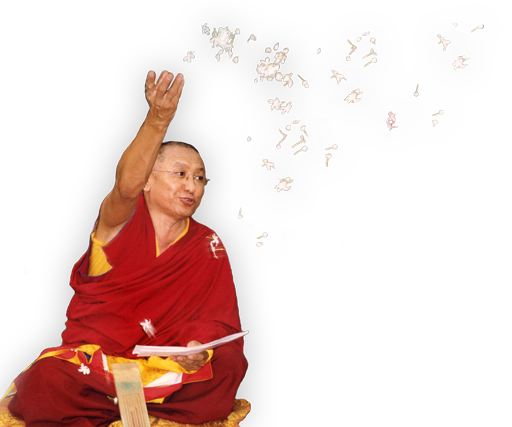anirodham anutpādam anucchedam aśāśvatam |
anekārtham anānārtham anāgamam anirgamam ||
yaḥ pratītyasamutpādaṃ prapañcopaśamaṃ śivam |
deśayām āsa saṃbuddhas taṃ vande vadatāṃ varam ||
clg/f]wdg'Tkfbd\ cg'R5]bdzf:jtd\ .
cg]sfy{dgfgfy{d\ cgfuddlgu{dd\ ..
oM k|tLTo;d'Tkfb+ k|k~rf]zd+ lzjd\ .
b]zofdf; ;Da'4:t+ jGb] jbtf+ j/d\ ..
With these words of noble Nagarjuna, I wish to pay homage to our Teacher, the Samyaksam-Buddha Shakyamuni, here in the sacred Lumbini Grove, the site of his auspicious birth, and on this auspicious day of Buddha Jayanti. May the priceless and immaculate Triratna bless us all.
After his wondrous birth in these gardens, the young Bodhisattva grew to become a splendid prince. But although born into all manner of royal splendor and perfection, young prince Siddhartha was nonetheless moved by the painful facts of impermanence. In the darkness of night, he left behind the royal palace at Kapilavastu to pursue perfect wisdom and knowledge of the way things really are. Leading the life of a humble mendicant, he sought knowledge and learning from the most esteemed and powerful teachers of his time. But the Boddhisattva remained dissatisfied, spurred on and sustained by the compassionate, enlightened resolve of his cittotpāda. After years of intense austerities, he came to the banks of the Narañjanā river and there took his seat at the Bodhimaṇḍa. Thus, by the tree of awakening, he definitively conquered the deceptions of the mārās and at dawn became the Buddha, demonstrating the way of true and complete awakening, anuttarā-samyaksaṃbodhi. We hear that soon after his awakening, the Buddha spoke these words, marveling at the nature of true insight, and with pity for the world:
“Profound, peaceful, stainless, lucid, and unconditioned—
Such is the nectar-like truth I have realized.
Were I to teach it, no one would understand,
So I will silently remain in the forest.”
Nonetheless, heading a vast divine assembly, the great gods Brahma and Śakra went before the Buddha to offer their worship and to beseech him to share his liberating wisdom with the world. Responding to their prayers, and in accord with his compassionate vow, the Buddha thus went on to turn the wheel of Dharma. At the deer park at Sarnath near Varanasi, he set in motion the initial Dharma wheel on the four noble truths; at the Vulture Peak mountain near Rājagṛha, he turned the intermediate Dharma wheel on the absence of characteristics; and at Śrāvasti and elsewhere, he turned the final Dharma wheel on fine discernment. Having thus skillfully conveyed the path of peace and non-violence and the view of absence of self, nirātmatā, and dependent origination, pratītyasamutpāda, to innumerable beings, our Teacher at Kuśināgara completed the sequence of great deeds of awakening, thus demonstrating the way of mahāparinirvāṇa.
As noble Nagarjuna states, the Buddha is a true teacher of peace. If we allow ourselves to sincerely listen to, investigate, and experience his teaching of profound dependent origination, we can all discover the path of natural peace, harmony, and the perfection of wisdom. Let us note the way our Buddha Bhagavan encourages us to meet his teachings with an open and critical mind. “Examine my words carefully,” he instructs us. “Be like a goldsmith, who tests and analyzes gold, and only accept my teaching once you yourself have seen its value.” What, then, is it that the Buddha teaches us? What is his message, and might there be something special to gain from following his teaching? Let us, as the Buddha himself advises us, examine these issues with an open and critical mind.
When in response to the prayers of the gods, the Buddha began to teach, his first word was duḥkha, “suffering.” Nobody wants to suffer and yet every sentient being of the world must endure suffering, again and again. No matter how powerful, wealthy, respected, and successful we may be, there is no sentient being that escapes pain, because nobody escapes impermanence. All things produced by causes and conditions are just transitory, and so there is nothing that we can truly rely on, nothing in which we can fully trust. No wandering being, whether high or low, is safe from suffering and misfortune, and we often find that those whom we might otherwise assume are the happiest in fact live in constant agony and fear. All that we build will, as the Buddha points out, sooner or later have to fall. Whatever we may succeed in gathering will at some point be depleted, and whomever we may meet and keep company with, eventually we must separate. Birth always ends in death. These are sorrowful thoughts to think yet they are also quite simply matters of fact. And facts should be acknowledged and taken into account. Of course, nobody would bring impermanence and suffering to mind simply for the sake of dwelling on painful issues. On the other hand, if we dare acknowledge these hard facts, we can thereby also begin to explore what may lie behind and cause them.
The Buddha teaches that when we suffer it is not due to the wishes of some supernatural being who is the master of the world. Yet neither is it the case that suffering is an unavoidable part of the natural world. When we examine things carefully, we will, explains the Buddha, find that it is our own mind, with its ignorant and unwholesome habits, that is the creator of pain. With this insight comes a tremendous sense of empowerment, because when we know what it is that causes suffering, we can begin to take charge of the situation. We can begin to heal ourselves, and help others find health and happiness too. This healing and transformation of both ourselves and others is what the Dharma path is all about:
“Do not commit any evil,
Do what is perfectly virtuous,
And tame your own mind—
That is the teaching of the Buddha.”
To follow the Buddha’s teaching we must then refrain from ten evils—three of which are committed physically, four verbally, and another set of three mentally. As followers of our Teacher, we must thus physically avoid killing other living beings, we must no take what was not properly given to us, and we must refrain from sexual misconduct. To avoid verbal evil, we must not lie, must not speak harshly, not create divisions among others, and we must refrain from idle chatter. Finally, to ensure that our minds do no evil, we must give up covetousness, ill will, and wrong views. But we are also instructed to ‘do what is perfectly virtuous.” Therefore, not only must we avoid the ten evils, we must also actively practice their opposites, the ten virtues: Rather than killing, we must save and protect the lives of others. Rather than taking what was not given, we must practice generosity, and rather than engaging in sexual misconduct we must abide by wholesome ethics. Likewise, avoiding the four evils of speech, we must instead speak the truth, speak gently, speak in ways that reconcile people and bring them together, and our speech should be meaningful and authentic. Finally, avoiding the three mental evils, we should rejoice in the successes of others, cultivate care, and develop knowledge of the way things really are. These practices of restraint from evil and engagement with virtue gradually allow us to “tame our own minds.” Thus, through the practices of calm abiding, śamatha, and special insight, vis-paśyanā, we may ultimately break free from the beginningless processes of evil and ignorance, achieving both vimokṣa and bodhi, and so accomplishing the aims of both oneself and all others.
Misery, pain, and death come about due to the mind’s habituation to blind craving and aggression. Yet the dependent arising of the causes and effects of suffering rests on nothing but an error, a fundamental failure to see dharmatā, the nature of things as they actually are. The immaculate words of the Dharma reveal the way of profound emptiness beyond all the mind’s constructs. And by taking the path of reasoning, their truth can be seen with the eye of supreme, inalienable insight. Just as a sprout depends on a seed, and just like “long” depends on “short,” everything is what it is because of, and in relation to, other things. And yet, those “other things” are also just like that: they too are dependent and contingent on still other things. And so it is, ad infinitum. If we look closer, we find that this seemingly simple fact of dependency and contingency—pratītyasa-mutpāda—pertains to absolutely everything that we might possibly perceive or conceive of. Nothing appears or exists by virtue of itself, or by its own nature. Everything owes its very existence and identity to something else, and so the search for origins, or ground truth, can in principle go on forever. There is always something more, something new, to discover, consider, and investigate. Yet precisely this fact that all things are dependent is then also the fact of their profound emptiness. Nothing is anything in and of itself, and this state of affairs can be acknowledged just as well as any other fact of the world. But the emptiness of one is the emptiness of all: when taken to heart, this insight into dependent origination carries infinitely profound and auspicious implications, for both oneself and all others.
Birth and cessation, going and coming, permanence and destruction, self and other—all of that which at first glance seems to be so solidly and undeniably real can, as we open the eye of insight, be seen to resemble a dream or a magical illusion; vividly apparent and yet not at all real the way it appears. This insight frees the mind of the ties of obscuring thoughts and emotions, and we come to witness, explains our Teacher, the inseparable unity of the appearances of pratītyasamutpāda and their profound nature of śūnyatā. As the Prajñāparamitā Sūtras teach: “Rūpaṁ śūnyatā śūnytaiva rūpaṃ. Rūpānna pṛthak śūnyatā śūnyatāyā na pṛthagrūpaṁ.” In the end, just as wetness cannot be separated from water, this present entity, or thought, is nothing else than the limitless field of all factors. Emptiness is, at once, both the nature and the necessary condition for all that appears.
The Buddha encourages us to acknowledge the painful and dependently originating facts of existence, and on that basis discover the true nature of dependent origination—the profound emptiness that transcends the sphere of word and thought. It is a marvelous fact that if we allow ourselves to critically investigate his teachings, we will discover their undeniable truth and authenticity. Thus, with the attainment of profound and unshakable certainty, one’s faith in and devotion for the Teacher and his Teaching will be transformed and perfected. With faith, compassion, and true insight, the bodhisattva passes through the gateway of the inconceivable. Realizing the natural unity of appearance and emptiness one travels, quickly and with ease, beyond the otherwise infinite ocean of painful existence. Having discovered the inconceivable wealth of the wisdom mind, the noble being will then fearlessly apply the methods of great compassion, mahākaruṇā, for the sake of others. Entering into innumerable forms of action for the benefit of others, one joins the universal activity of all the buddhas and bodhisattvas, bringing suffering sentient beings to the rich and bountiful continent of liberation. That journey from ceaseless pain to lasting, true happiness is not a matter of actually travelling somewhere. Yet as we see the profound reality that is the nature of things, the path has already been accomplished.
Today, esteemed leaders of nations who are entrusted with the Awakened One’s profound heritage for the world meet here where our Teacher first placed his feet upon the ground. Thinking of this joyous and auspicious meeting, I pray that the brilliant sun of the Dharma of peace may spread its liberating light throughout the world, and that innumerable flowers of wisdom and compassion may so come to blossom in the hearts of us all.
Offered by Chökyi Nyima Rinpoche
on the auspicious day of Buddha Jayanti.
Jesth 2nd 2079.
cfo{ gfufh'{gn] n]Vg' ePsf] of] Znf]saf6 xfd|f zf:tf ;Dos;+a'4 zfSod'lgnfO{ pxfFsf] kljq hGd:yn n'lDagL pkjgdf a'4hoGtLsf] lbgdf jGbgf u5'{ . cd"No tyf ljdn lq/Tgn] xfdL ;a}nfO{ clwli7t u?g\ .
pQm pkjgdf cb\e"t ?kdf hGd lnO;s]kl5 o'jf af]lw;Tj /fhs'df/sf] ?kdf eJotfsf;fy x's{g' eof] . /fhsLo eJotf / k"0f{tfsf ;fy hGd lnP klg o'jf /fhs'df/ l;4fy{nfO{ clgTotfsf] b'Mvb\ jf:tljstfn] ljrlnt u/fof] . /ftsf] cGwsf/df slknj:t'sf] /fhk|f;fbnfO{ Tofu]/ k/d k|1f / j:t'x?sf] oyfy{ l:yltsf] af]wsf] vf]hLdf nfUg' eof] . ;fdfGo ;GGof;Lsf] hLjg ofkg ub}{ af]lw / k|1f k|fKt ug{ To; a]nfsf ;aeGbf ljVoft / k|efjzfnL u'?x?sf] ;ª\ut ug'{ eof] . af]lw;Tj c;Gt'i6 eP/ pxfFsf] lrQf]Tkfbsf] sf?l0fs / af]lwk|lt k|lta4 k|]/0ffnfO{ sfod /fVg' eof] . jiff}{F;Ddsf] s7f]/ tk:ofkl5 g}/~hgf gbLsf] lsgf/df cfP/ af]lwd08df cf;g u|x0f ug'{ eof] . af]lwj[Ifåf/f df/x?sf 5nx?nfO{ k/flht u/]/ laxfgL kv cg'Q/ ;Dos ;+af]lw k|bz{g ub}{ a'4 aGg' eof] . af]lw k|fKt x'g] lalQs} oyfy{ 1fgsf] cb\e"tkgf tyf ;+;f/k|ltsf] s?0ff JoQm ub}{ o:tf] eGg' eof] M–
æuDeL/, zfGt, ljdn, :ki6 / c;+:s[t
o:tf] cd[tt'No ;Tosf] af]w dnfO{ ePsf] 5 .
o;sf] af/]df atfpbf s;}n] klg a'e\mb}gg\
To;}n] jgdf df}g ?kdf /xG5' .Æ
To;f] ePtf klg 7"nf] ;+Vofdf b]ju0f;lxt a|Dxf / zs| b]jx? a'4 ;dIf cfP/ k"hf u/] / pxfFsf] df]IfbfoL k|1f ;+;f/nfO{ k|bfg ug{ cg'/f]w u/] . pgLx?sf] k|fy{gf tyf ck\mg} s?0ffdo k|lt1fdf cfwfl/t eP/ wd{rs| k|jt{g ug{ tof/ x'g' eof] . jf/f0f;L glhs}sf] ;f/gfy l:yt d[ubfj jgdf rf/ cfo{ ;To;+u ;DalGwt klxnf] wd{rs| k|jt{g ug'{ eof] eg] /fhu[x l:yt u[w|s'6 kj{tdf nIf0f /lxttsf] ljifodf bf];|f] wd{rs| k|j{tg ug'{ eof] . To:t} >fj:tL nufotsf :yfgx?df /fd|f];Fu hfFlrPsf] t];|f] wd{rs| k|j{tg ug'{ eof] . zflGt / clx+;fsf] dfu{ tyf cgfTd / k|tLTo;d'Tkfbsf] b[li6nfO{ s'zntfk"j{s cgluGtL JolQmx?nfO{ bzf{P/ xfd|f zf:tf a'4n] s'zLgu/df dxfkl/lgjf{0f bzf{P/ af]lw rof{sf] nLnfnfO{ k"0f{ ug'{ eof] .
cfo{ gfufh'{gn] atfP em}F a'4 zflGtsf jf:tljs u'? x'g'x'G5 . pxfFsf k|tLTo;d'Tkfb ljifosf eDeL/ pkb]zx?nfO{ /fd|f];Fu ;'Gg], lrGtg ug]{ / cg'ej ug]{ xf] eg] xfdL ;a}n] jf:tljs zflGt, d]nldnfk / k|1fkf/ldtf kQf nufpg ;S5f}F . xfd|f eujfg\ a'4n] v'nf / ljj]rgfTds lrQ;lxtsf pxfFsf pkb]zx? kfpgsf nflu ul/Psf] k|]/0ffnfO{ x]/f}F . a'4 eGg' x'G5 , æd]/f zAbx?sf] /fd|f];Fu k/LIf0f u/ . h;/L ;'gsf] sfd ug]{ dfG5]n] ;'gnfO{ hfFr]/ k/LIf0f u5{ , To;} u/L d]/f pkb]zx?sf] dxTjnfO{ x]/]/ hfFr]/ dfq :jLsf/ u/ .Æ To;f] eP a'4n] xfdLnfO{ s] l;sfpg' x'G5 t < pxfFsf] ;Gb]z s] xf] / pxfFsf pkb]zx?sf] cg'z/0f u/]/ ljz]if s'/f s] kfOG5 t < a'4n] ;'emfP em}F oL s'/fx?nfO{ v'nf / ljj]rgfTds lrQåf/f ljZn]if0f u/f}F g t .
b]jx?sf] cg'/f]wsf] pQ/ lbg]s|ddf a'4n] k9fpg yfNbf pxfFsf] klxnf] zAb g} b'Mv lyof] . sf]xL klg b'Mv rfxb}g . t}klg ;+;f/sf x/]s k|f0fLx?n] af/Daf/ b'Mv g} ef]Ug' kl//x]sf] 5 . hlt g} zlQmzfnL, wgL, ;Ddflgt / ;kmn JolQm eP klg b'Mvaf6 efUg ;Sg] sf]xL klg 5}g lsgls clgTotfaf6 sf]xL klg efUg ;Sb}g . x]t' / k|Tooaf6 k}bf ePsf ;a} s'/f s]jn Ifl0fs x'g\ . To;}n] ;fFlRrs} e/ kg{ nfos s]xL klg 5}g . xfdLn] k"0f{ ?kdf ljZjf; ug{ of]Uo s'/f s]xL klg 5}g . pRr :t/sf x'g\ jf lgDg :t/sf x'g\ s'g} klg ef}Ftfl/Psf k|f0fL b'Mv / b'ef{Uoaf6 ;'/lIft 5}gg\ . xfdLnfO{ ;a}eGbf ;'vL h:tf nfUg] JolQmx? klg lg/Gt/ j]r}gL / qfzdf afFr]sf kfpg ;S5f}F . a'4n] atfP cg';f/ xfdLn] lgdf{0f u/]sf x/]s j:t' l9nf] xf];\ jf rfF8f] eTsG5g\ . xfdLn] hDdf kfg{ ;kmn ePsf s'/f s'g} klg a]nf l/lQg ;S5g\ . xfdLn] e]6]sf / ;Fu} /xg rfx]sf JolQmx?;Fu 5'l6\6g} kg]{ x'G5 . hGdsf] cGt ;w}F d[To' g} x'G5 . logLx? tYo g} eP klg b'Mvb ;f]rx? g} x'g\ egL a'e\mg' k5{ . oL tYox?nfO{ :jLsf/ u/]/ Vofn ug'{ kb{5 . jf:tjdf xfd|f] dgdf oL b'Mvb 36gfx?df /xg] clgTo / b'Mv s;}n] klg NofOlbPsf x}gg\ . csf]{ tk{m olb xfdLn] o:tf oyfy{ tYox?nfO{ :jLsfg{ yfNof}F eg] ltgLx?sf] k5fl8 s] /x]sf] 5 / s'g sf/0fn] o:tf] ePsf] xf] eGg] af/]df kQf nufpg yfN5f}F . a'4n] l;sfpg' ePsf] 5 ls xfdLnfO{ b'Mv x'Fbf Tof] ;+;f/nfO{ ;~rfng ug]{ s'g} b}jL zlQmsf] sf/0fn] ePsf] x}g . To:t} b'Mv eg]sf] k|s[ltsf] hf]lug} g;lsg] c+z klg x}g . a'4n] atfP cg';f/ xfdLn] o;nfO{ xf]lzof/Lk"j{s s]nfpFbf kfFp5f}F ls b'Mvsf] lgdf{tf t cljBf / cs'zn afgLx?n] o'Qm ePsf] xfd|f] cfk\mg} lrQ /x]5 . o:tf] cGt/b[li6af6 ckf/dfqfdf ;zlQms/0fsf] efj k}bf x'G5 . ha xfdLnfO{ yfxf x'G5 ls oxL lrQn] b'Mv l;h{gf u/]sf] /x]5 ta xfdL of] kl/l:yltsf] cleef/f xfdL cfk}mFn] lng yfN5f}F / c?nfO{ klg :j:y / v';L x'g ;xof]u ug{ yfN5f}F . xfd|f] cfk\mgf] / c?x?sf] pkrf/ / ?kfGt/0f g} wd{sf] dfu{ af/]sf] ;ayf]s xf] .
s'g} klg cs'zn sd{ gu/ .
s'zn sd{sf] k"0f{?kdf cEof; u/ .
/ cfk\mgf] lrQnfO{ cfk}mn] j;df /fv .
oxL g} a'4sf] pkb]z xf] .
a'4sf pkb]zx?sf] cg'z/0f ug'{ eg]sf] tLg zf/Ll/s, rf/ jflrs / tLg dfgl;s u/L bz cs'zn sd{x? ug{af6 hf]lug' xf] . xfd|f zf:tf a'4sf] cg'ofoL ePsf] gftfn] xfd|f] hLpaf6 c? k|f0fLx?nfO{ dfg]{, xfdLnfO{ glbPsf lrhx? lng] / of}g Jolerf/ ug]{ h:tf sflos cs'zn sd{x? ug'{ x'Fb}g . jflrs cs'zn sd{x?af6 aRg em"7f] af]Ng xF'b}g, s8f zAb k|of]u u/]/ af]Ng' xF'b}g, c?sf] aLrdf kmf6f] Nofpg] u/L af]Ng' x'Fb}g / lg/y{s jftlrt ug{af6 hf]lug' k5{ . cGtdf xfd|f] dgnfO{ cs'zn x'gaf6 arfpg nf]e, s'ljrf/ / ldYofb[li6nfO{ TofUg' k5{ .
To;} u/L xfdLnfO{ …s'zn sd{nfO{ k"0f{ ?kdf cEof; u/ .Ú elgPsf] 5 . t;y{ xfdL bz cs'zn sd{x? ug{af6 aRg] dfq geO{ xfdLn] ltgLx?sf k|ltkIfL bz s'zn sd{x?sf] cEof; ug}{ k5{ . xTof ug'{sf] ;f6f] xfdLn] c?x?sf] Hofg hf]ufpg' / arfpg' k5{ . c?n] glbPsf s'/fx? lng'sf] ;f6f] bfg lbg] cEof; ug'{ k5{ . of}g Jolerf/df nfUg'sf] ;f6f] s'zn sfd u/L g}ltstfdf /xg' k5{ . To;} u/L rf/ k|sf/sf cs'zn af]lnx? af]Ngaf6 ar]/ ;To af]Ng' k5{, gd| af]ln af]Ng' k5{ dflg;x?nfO{ ldnfpg] / h'6fpg] vfnsf] af]ln af]Ng' k5{ . ;fy} ;fy{s / cflwsfl/s af]ln af]Ng' k5{ .
To;} u/L cGtdf tLg k|sf/sf dfgl;s cs'zntfx?af6 ar]/ c?x?sf] ;kmntfdf cg'df]bg ug'{ k5{, c?x?sf] x]/ljrf/ ug'{ k5{ / j:t'x? h:tf 5g\ To:t} cj:yfdf a'e\mg] af]wsf] ljsf; ug'{ kb{5 . cs'zn sd{x?af6 aRg] / s'zn sd{x?df nfUg] oL cEof;x?af6 lj:tf/} xfdLnfO{ cfk\mgf] lrQ tx nufpg] cj;/ k|fKt x'G5 . o;/L zdy / ljkZogfsf cEof;x?af6 xfdLn] cgflb sfnb]lv ub{} cfPsf cs'zn sd{x? / cljBfsf] rln/x]sf k|ls|ofx?nfO{ k"0f{ ?kdf tf]8]/ ljdf]If / af]lw k|fKt ub}{ cfk\mgf] / c?x?sf] nIox? k"/f ug{ ;S5f}F .
ljkGgtf, kL8f / d[To'x? cGwt[i0ff / å]ifk|ltsf] dgsf] afgL -nufj_ sf sf/0fn] x'g] ub{5g\ . b'Mvsf sf/0f / c;/x?sf] k|tLTo ;d'Tkfb s]xLdf cfwfl/t geP/ Pp6f e|ddf cfwfl/t x'G5 . wd{sf kljq zAbx?n] dgsf ;a} tfgfjfgf -k|k~r_ x? eGbf k/sf] uDeL/ z"Gotf dfu{nfO{ phfu/ ub{5g\ . To;} u/L o'lQm dfu{åf/f ltgLx?sf] ;TotfnfO{ pQd / ce]B k|1f rIf'åf/f b]Vg ;lsG5 . h;/L Pp6f lj?jf jLpdf cfwfl/t x'G5 To;/L g} x/]s s'/f csf{ s'/fdf cfwfl/t eP/ b]vf k5{g\ . To;} u/L csf{ y/L klg c? csf{ y/Ldf cfwfl/t x'G5g\ . ltgLx? klg cs}{ cs}{ s'/fx?df cfwfl/t x'G5g\ . of] s|d cgGt ;Dd} rnL /xG5 . olb xfdLn] cem glhsaf6 x]¥of}F eg] xfdLn] kQf nufpF5f}F ls lge{/tf / ;Defjgf cyf{t k|tlTo ;d'Tkfbsf] ;fdfGo h:tf] nfUg] tYo xfdLn] ef]u]sf jf cg'ej u/]sf x/]s s'/fx?df k"0f{ ?kdf nfu" ePsf] x'G5 . cfk}mF jf cfk\mg} k|s[ltsf] sf/0fn] s]xL klg b]vf kb}{g cyf{t cl:tTjdf cfpFb}g . s'g} klg s'/fsf] cl:tTj / klxrfg cs}{ s'/faf6 cfpF5 . pb\udsf] vf]hL jf w/ftnLo ;To l;4fGtt oxL s|ddf x'G5 . x/]s kN6 s'g} gofF s'/f, cem a9L s'/f kQf nufpg' kg]{, Vofn ug'{ kg]{ / k/LIf0f ug'{ kg]{ x'G5 . cem eGg] xf] eg] ;a} s'/fx? ;fk]If 5g\ eGg] s'/f klg uDeL/ z"Gotfsf] tYo xf] . s]xL gePsf] s'/f cfkm}Fdf s]xL s'/f xf] / of] dfldnf ;+;f/sf] csf]{ tYosf] ?kdf :jLsf/ ug]{ cj:yf xf] . t/ Pp6fsf] z"Gotf ;a}sf] z"Gotf xf] . of] s'/fnfO{ x[boª\ud ubf{ k|tLTo;d'Tkfbsf] of] cGt/b[li6n] cfk"m / c? ;a}nfO{ ckf/ dfqfsf] uDeL/ / z'e cj:yfx? NofpF5 .
pTkfb / lg/f]w, cfpg] / hfg], lgTotf / ljgfz, cfk"m / c? h:tf ;a} s'/f klxnf] b[li6df 7f]; ?kdf / ckl/xfo{ ?kdf jf:tljs nfu] klg ha xfdLn] k|1fsf] rIf' vf]N5f}F ta ;kgf jf hfb"sf] e|d h:t} b]lvg yfN5g\ ;To / 7f]; 7flgPsf s'/fx? hLjGt ?kdf b]vf k/] e}mF nfu]sf s'/fx? PsfPs cjf:tljs nfUg yfN5g\ . of] cGt/b[li6n] dgnfO{ 9fs]sf ljrf/ / ;+j]ux?sf] aGwgaf6 d'Qm ub{5 . a'4n] atfP em}F k|tLTo;d'Tkfbsf b[iox? tyf ltgLx?sf] uDeL/ z"Gotf k|s[ltsf] o'ug4tfsf] ;fIfL aGg k'U5f}F . k|1fkf/ldtf ;"qx?df o:tf] atfOPsf] 5 – …?kd\ z"Gotf, z"Got}j ?kd . ?kfGg k[yu z"Gotf z"Gotof g k[yu ?kd .Ú cGtdf h;/L lr:ofgnfO{ kfgLaf6 cnu kfg{ ;lsGg To;/L g} jt{dfg klxrfg jf ljrf/ klg ;Dk"0f wd{x?sf] cgGt wft'af6 csf]{ x}g . t;y{ z"Gotf ;Dk"0f{ b[iox?sf] :jefj / cfjZos kl/l:ylt xf] .
a'4n] xfdLnfO{ ;+;f/sf] b'Mvb / k|tLTo;d'TkGg tYox?nfO{ :jLsfg{ / To;sf] cfwf/df k|tLTo;d'Tkfbsf] jf:tljs :jefj h'g zAb / ljrf/ eGbf k/sf] z"Gotf xf] To;nfO{ kQf nufpg k|]l/t ug'{ x'G5 . olb xfdLn] cfk"mdf pxfFsf pb]zx?nfO{ ljj]rgfTds ?kdf hfFRg 5f8L lbof}F eg] xfdLn] ckl/xfo{ ;To / cflwsfl/stf kQf nufpg] 5f}F . h'g Pp6f cb\e"t tYo xf] . o;/L uDeL/ / b[9 lgZro k|fKt u/] kl5 a'4 / jxfFsf pkb]zx?k|ltsf] >4f / elQm ablng] 5 / k"0f{ x'g] 5 . >4f, s?0ff / oyfy{ cGtb[li6n] o'Qm eP/ Ps af]lw;Tj clrGTosf] åf/df k|j]z u5{ . b[io / z"Gotfsf] :jefljstfnfO{ af]w u/]/ ej;fu/sf] b'Mvb ;+;f/af6 l56\6} / ;lhn};Fu kf/ x'g] ofqfdf nfUb5 . 1fg lrQsf] ckl/ldt ;DklQ kQf nufP/ Ps cfo{n] c?x?sf] lxtsf] nflu dxfs?0ffsf pkfox? lge{otfsf ;fy k|of]u ug]{5 . c?x?sf] lxtsf nflu cgluGtL ?kx?df k|j]z u/]/ ;Dk"0f{ a'4 / af]lw;Tjx?sf] ljZjJofkL ls|ofsnfkdf cfa4 eP/ k|f0fLx?nfO{ b'Mvaf6 df]Ifsf] ;+j[4 / s[kfn' dxfåLkdf k'¥ofpF5 . c6'6 b'Mvaf6 :yfoL / jf:tljs ;'vdf k'Ug] ofqf s'g} 7fpFsf] ;fFlRrs} e|d0f u/]sf] dfq x}g . j:t'x?sf] oyfy{ :jefj cyf{t uDeL/ oyfy{tfnfO{ b]Vbf klxn] g} dfu{ kf/ ul/;s]sf x'G5f}F .
cfh a'4sf uDeL/ ;DkbfnfO{ ljZjdf k}mnfpg ljZjf; ul/Psf ;Ddflgt /fi6«k|d'vx?sf] eujfg\ a'4n] klxnf] kN6 w/tLdf kfOnf 6]s]sf] :yfgdf e]6 x'Fb}5 . of] ;'vb\ / d+undo e]6nfO{ ;f]r]/ d k|fy{gf ub{5' ls zflGt wd{sf] pHHjn ;"o{n] cfk\mgf] df]IfbfoL Hof]lt ;+;f/e/ k}mlnof];\ tyf k|1f / s?0ffsf cgluGtL k"mnx? xfdL ;a}sf x[box?df k'mn"g\ .
a'4 hoGtLsf] z'e cj;/df 5f]SoL GoLdf l/Gkf]5]åf/f
h]7 @, @)&( df ;dlk{t .




